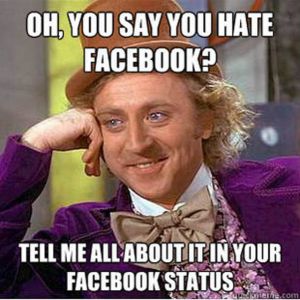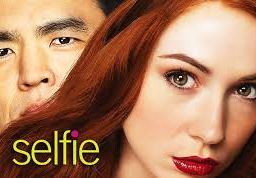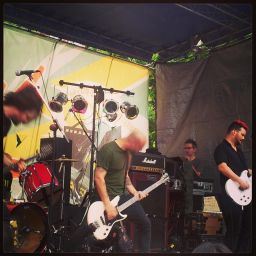I started doing web content/social media work professionally in 2006. Before that, I worked in communications and my blogging was something I strictly did for fun, I had a personal blog that I updated regularly, and where I did a lot of personal writing. About a year and half ago, after years of having an almost obsessive enthusiasm about all things social media, I burned out. Bad.
At its best, social media is powerful medium to connect people with common interests and drive movements, it can be a tool for change and a great way to spread ideas and creativity. At its worst, it’s filled with stupid in fighting, trolls and self-obsessed, self-promotional douchebaggery. And working in social media, even now, is often about chasing trends or constantly having to justify your existence to employers who think you play on Facebook all day. So I get it.
I have always had a love-hate relationship with Internet culture and social media. But a year and a half ago, I hit a wall, and stayed there. Some of it was driven by what was going on personally in my life, particularly the deaths of two people I loved dearly and me feeling like I had to keep up a “positive attitude” online. But a lot of was just being on social media all the time and not having clear dividing lines between my personal and professional life. I strongly believe that social media at its best is about sharing your genuine self in someway, whether its creative work, or strong opinions or a unique perspective on an issue. But especially for anyone who does community manager work, social media quickly and easily creates a gray area between these two worlds.
Anyway, I did a lot of internal soul searching and I learned a lot. I ditched my Facebook profile for awhile, I even (permanently) blocked it on my laptop. I started to give myself “social media timeouts” and I thought a lot about what it means to do this work, because at the end of the day, I do love it, I do feel like it’s where I belong. But thankfully, blessedly, we are more than what we like, or share or pin. So how do we maintain this balance, if we work in social media? Here’s what has worked for me.
Create a personal social media “editorial policy” I’ve had one of these for about 10 years, when I started my first blog. It’s basically my list of rules about what I will and won’t discuss online, my dividing line for what’s off limits for me to talk about. I won’t list the entire policy here, but for me, off limits includes not mentioning/referencing friends who aren’t online without asking them, and not talking about my personal life in specifics unless it’s really significant news. Over time, this policy evolved and changed over time – and I’ve broken a few of my own rules. But it’s helped me to have rules in the first place and it’s given me a template to draw from when I join new platforms like Pinterest, etc. When coming up with your own personal editorial policy, you don’t have to write it down, or even share it publicly. You do, however, have to specifically define your “off limits” dividing line regarding what you choose to share. I think that’s the most important part.
Cherish your anti-social media friends/loved ones
You know the friends that get mad at you for checking into Foursquare at dinner and call Twitter “Tweeter?” They are THE BEST because they get you away from social media overload, don’t give a rat’s ass about what happened at SXSW this year and get bored when you talk about that article you read on TechCrunch. They want to go to the beach with you or watch “The Good Wife” with you or play basketball with you or make out with you or have mexican food with you. And they don’t want you to talk about Facebook Timeline while you’re doing these things. They’ll tell you that social media is stupid. And you don’t have to always agree with them. But for a few hours a week, you should.
Get a non-screen based hobby
Personally, this saved my sanity. As much as I love writing this blog, it doesn’t get me off the damn computer. But playing bass guitar and writing music does. And running sure does. And as I learned to recommit myself to my career motivations, I equally committed myself to enjoying my non-screen based hobbies and found my focus returning. So when I did get back in front of a computer, I didn’t secretly resent it.
Stop being everyone’s friendly neighborhood unpaid web/social media consultant
This is especially for the ladies. We are notorious for this. Your friend needs a Facebook page for his small business, your uncle needs a “small” website for his church choir, a friend of a friend needs help with understanding Twitter. And they know you do it for a living and want to “pick your brain.” I’m not saying you have to say no. No, I am saying you have to say no. I am bad at this, so I’m not saying it’s easy. But one small project becomes hours of work on Facebook that you could be spending kayaking or making a pie or going to see the Hunger Games, if you are into that. But the more you say no, the easier saying no becomes. Here’s the thing (and web designers, writers and graphic artists can vouch for this) When you do work that’s kind of creative and seemingly “fun” some people think that a.) it’s fun all the time and b.) you get paid in “fun” I think the way to stop this is by putting a hard stop on working for free (or “experience” or “exposure”) If I had the time, I would go on Craigslist and personally go to the office of every small business looking for an unpaid “social media guru/intern” and give them a piece of my mind. I’ve written before that writers have screwed themselves by doing professional jobs for free and social media community manager roles are moving in that direction. So let’s stop making professional social media strategy “fun” and let’s make it work, so we can spend our free time doing actual fun stuff.
So anyway, these are the 4 things that have kept me from losing it and have helped me to create a balance in my social media life and my personal life. It’s not easy, especially when you know will have to work 10 -12 hour days and/or weekends or whatever. But man has it been helpful.







We’ve talked about burnout before and I love that you put it down in writing. I’m totally going to apply some your tips.
I’m really impressed along with your writing skills as well as with the format in your blog. Is this a paid topic or did you customize it your self? Either way keep up the excellent quality writing, it’s uncommon to look a great blog like this one today..